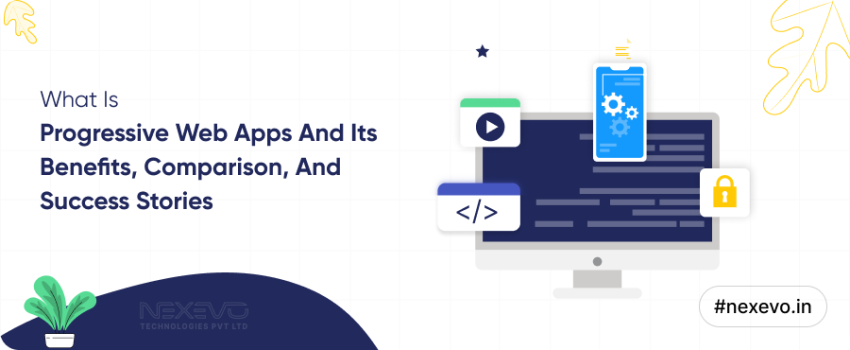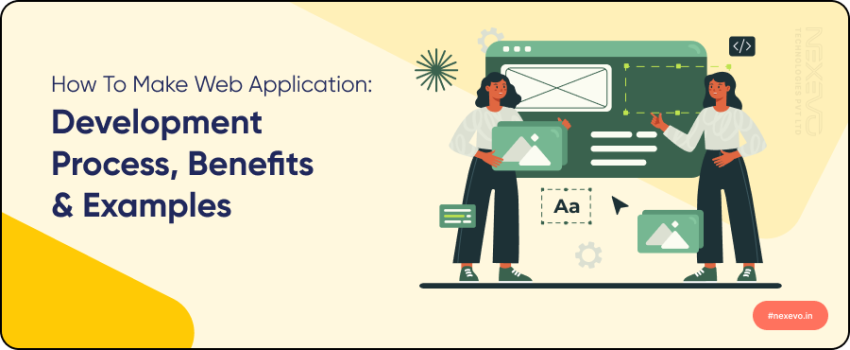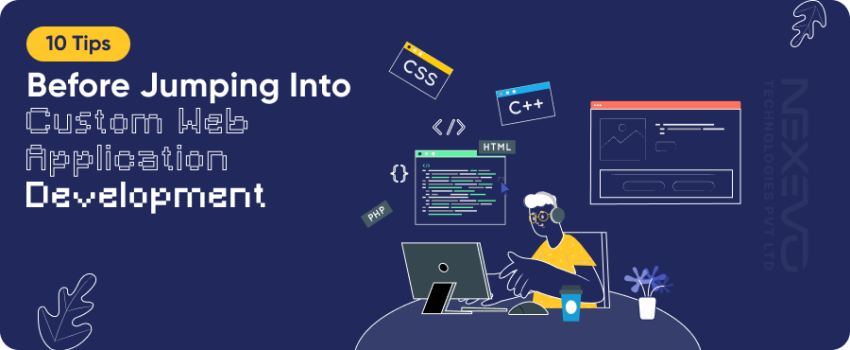What is Progressive Web Apps and its Benefits, Comparison, and Success Stories

Get to know how PWAs offer a flawless blend of web and mobile experiences, with more benefits like cross-platform compatibility, improved user engagement, and reduced data usage. Explore and read real success stories from top companies like MakeMyTrip and Flipkart, and find out how PWAs can push your business to the next level in this digital age. Whether you're a developer or a business owner, this blog is your doorway to understanding the impact of PWAs and harnessing their growth potential.
What is a Progressive Web App(PWA)?
Progressive Web App(PWA) development is the process of creating web applications that give a user experience similar to native mobile apps. Progressive Web Apps(PWAs) are web-based applications that make use of modern web technologies to give features like push notifications, offline access, and hardware access to devices. They are built with web technologies like HTML, CSS, and JavaScript, and they are designed to be responsive, reliable, capable, and engaging across different devices and network conditions. PWAs can be easily installed in the device without the use of an app store, making them easily accessible and convenient. The aim is to provide a smooth and engaging experience to the user with web content by combining the web and mobile app experience.
Benefits of Progressive Web App(PWA)
Let's explore the benefits of the progressive web apps(pwas) and learn how PWA's offer cross-platform compatibility, enhanced user experience, offline functionality, improved discoverability, automatic updates, and reduced data usage.
Let's experience the benefits of Progressive Web App in web application development:
Cross-Platform Compatibility: The key benefit of PWA works perfectly across different operating systems and devices like mobile, tablet, and desktop. Because of its usability, there is no need to create a separate app for every platform, which in turn reduces the development time and cost.
Improved User Experience: PWAs provide a fast, responsive, and engaging user experience similar to native mobile
apps. They offer smooth animations, intuitive navigation, and full-screen mode, enhancing user satisfaction and
retention. One important benefit of PWAs is their ability to work offline, allowing users to access content even when they're not connected to the internet. This offline capability ensures uninterrupted access to essential features and content, improving user experience and retention rates.
Offline Functionality: One of the important benefits of PWAs is that they can be run offline or in low-connectivity
areas. Users can access the app and content without an internet connection because PWAs can cache content and store
user data locally.
Discoverability and Accessibility: Progressive Web Applications are easier for users to find in the search engine
than native apps, which are installed from the app store. This increased discoverability can lead to higher user
acquisition and engagement. Furthermore, the benefit of progressive web apps is that they reduce friction in the acquisition process by doing away with the requirement for customers to download and install apps from an app store. Users are encouraged to explore and interact with the application more readily as a result of this easy access, which eventually increases user acquisition and retention rates.
Automatic Updates: The other benefit of PWAs is that it is automatically updated in the background, ensuring that the
user always uses the latest version of the app without the need for manual updation or updation from the app store.
This process improves the security and keeps the web app optimized.
Reduced Data Usage: PWAs consume less data compared to traditional websites or native apps, making them more
economical for users, especially in regions with limited data plans or expensive internet access.
Progressive Web App vs Native App
Development Time and Cost:
Progressive Web Apps (PWAs): They require less development time and cost because they use web technologies such as HTML, CSS, Javascript, and a single codebase that works across multiple platforms.
Native app: It requires separate development time and cost because it is developed on platforms such as IOS, and Android.
Accessibility:
Progressive Web App(PWAs): PWAs are accessed through web browsers, making them instantly available to users without the need for installation from an app store. This accessibility can lead to a wider reach and easier adoption
Native app: Native apps require users to find, download, and install them from app stores.
Performance:
Native apps tend to offer better performance and smoother user experiences compared to PWAs, especially for complex functionalities and graphics-intensive applications. Native apps have direct access to device hardware and APIs, allowing for optimized performance. PWAs, while improving, may still have limitations in performance, particularly for resource-intensive tasks.
Offline Functionality:
Progressive Web App(PWAs): PWAs can provide limited offline functionality by caching content and data, allowing users to access certain features and content without an internet connection.
Native app: Native apps generally offer more robust offline capabilities, as they can store larger amounts of data locally and provide more seamless offline experiences.
Device Integration:
Progressive Web App(PWAs): PWAs can access some device features through web APIs, but they may not have the same level of integration as native apps.
Native apps: Native apps have greater access to device features and functionalities, such as push notifications, cameras, GPS, and sensors, which can lead to more engaging user experiences.
Also know the Native vs. Hybrid vs. Web Apps: Choosing the Right Mobile App Development that Fit for Your Business
Are PWAs right for you?
If you're looking for a way to reach a wider audience without the limitations of native apps, PWAs are worth considering. They're a great fit for content-driven apps, e-commerce platforms, or anything that needs to be fast, reliable, and accessible. You can also get help from web development agencies to get to know whether PWA is best suited for your business
Success Stories and Examples of companies that have benefited from PWAs
MakeMyTrip: A PWA was implemented by MakeMyTrip, a
well-known online travel service in India, to improve the user experience for passengers.
Flipkart: To enhance its consumers' mobile purchasing experience, Flipkart, one of the biggest e-commerce sites in India, adopted PWAs. The company's PWA,
Flipkart Lite, has quick loading times, seamless navigation, and offline capability.
Starbucks: To give customers a better mobile ordering experience, Starbucks launched its PWA. The Starbucks PWA provides offline capabilities, a quick
ordering procedure, and an intuitive UI.
BookMyShow: To enhance its mobile web experience, BookMyShow, a platform for purchasing tickets for events and movies, deployed a Progressive Web App (PWA). The PWA from BookMyShow provides quick loading speeds, offline ticket booking access, and push alerts for event reminders.
And there are more Success stories of top companies that have benefited from PWAs
Conclusion
In conclusion, Progressive Web Apps is a huge development in mobile technology that gives companies an adaptable and affordable way to provide consumers with high-quality, captivating experiences across all platforms and devices. Businesses may seize new chances for expansion, creativity, and success in the digital market by implementing PWAs.
If you're ready to explore the possibilities of PWAs for your business, we're here to help. Get in touch with us today to discuss your project requirements and take the first step towards unlocking the full potential of Progressive Web Apps with Nexevo Technologies.









